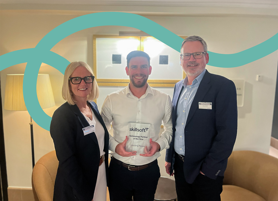Blog
Explore our blog for industry insights and student success stories that inspire your career journey. Stay informed with the latest trends in tech, cybersecurity, project management, and more.
Showing 1 - 12 of 178 articles
Filter By
Showing 1 - 12 of 178 articles
Project Management News & Insights
News & Insights Cyber Security
Cyber Security Cyber Security
Cyber Security News & Insights
News & Insights Cyber Security
Cyber Security Cyber Security
Cyber Security Data Science
Data Science Cyber Security
Cyber Security Project Management
Project Management Cyber Security
Cyber Security Cyber Security
Cyber Security

6 min read
Highlights from the APM Salary and Market Trends Survey 2025: What does this mean for the project management sector?
By Matt EverittRead More

5 min read
The Prime Minister's talk at London Tech Week 2025: What does this mean for the tech job market?
By Gareth LautenbergRead More

5 min read
Learning People joins UK Cyber Security Council
By Gareth LautenbergRead More

7 min read
Cyber threats every business needs to know about in 2025
By Jasmine SchneiderRead More

5 min read
Celebrating our Skillsoft Technology Content Partner of the Year 2025 award
By Polly McLachlanRead More

7 min read
Adidas cyber attack: Your sign to get a career in cyber security
By Jasmine SchneiderRead More

7 min read
Cyber security salaries in the UK: What to expect in 2025
By Jasmine SchneiderRead More

7 min read
The future of data science: Trends to watch in 2025
By Polly McLachlanRead More

7 min read
Beginner’s guide to ethical hacking (and how to get certified)
By Polly McLachlanRead More

7 min read
Sustainability in Project Management | PMP & ESG Integration
By Polly McLachlanRead More

7 min read
What does a cyber security analyst do? (And how to become one)
By Polly McLachlanRead More

7 min read
What soft skills do you need for a career in cyber security?
By Chelsey MurrayRead More
Showing 1 - 12 of 178 articles
